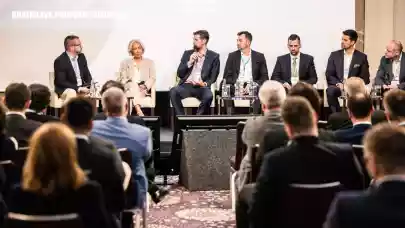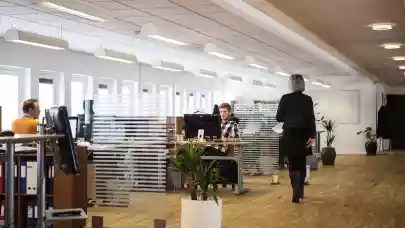
The uneasy geopolitical situation of the recent years is surely not helping investors in Slovakia and the CEE region, that is a reality investors live in. However, the discussion of the first panel during Bratislava Property Forum 2024 has revealed that there is still some room for optimism.
„This year we are hoping for greater things,“ Kevin Turpin, Regional Director of Capital Markets for CEE at Colliers and the moderator of the investment panel, stated a rather positive outlook. On the other side, he reminded us to better keep the investors´ feet on the ground. „The figures and levels from pre-pandemic could be forgotten for now. What are the risks related to what's going on in the region, then?“ Turpin laid out the leading question to set off the discussion.
First of all, Zuzana Kanalová, Head of Real Estate at VÚB Banka, emphasized the fact that the Central European market is completely different and cannot be compared with Western European markets. She also admitted: „I wouldn't say that the geopolitical situation is not affecting our decision so far.“
Martin Polák, Managing Director CEE at Garbe Industrial Real Estate admitted that investors in the industrial and logistic sector are still enjoying a good time. „That part of our business doesn´t have any major issues right now and there is not much to complain about.“ On the other hand, the sector is suffering from not having enough local capital, it relies on the Czech capital a lot. Not to be too negative, Polák foresees a slow improvement in the next 24 months: „If you have a good product, I think you can place it on the market and you can sell it quite well.“
Last year, investors in the region were worried about the situation in Ukraine and the geopolitical closeness of Slovakia to Ukraine. This year, investors have started to ask questions about the political situation in Slovakia. This could encourage some investors to look for opportunities elsewhere. Roman Kubányi, Director for International Commercial Real Estate Clients at Erste Group Bank AG, sees a good outlook for their activities in the Polish market and SEE. „Southeast Europe, especially for logistics, has a lot of potential. We still see that the market is rather undeveloped there. Anyone willing to construct there, we would be happy to finance it.“
Turning the focus of the discussion from logistics to other segments, Kevin Turpin asked about the challenges in the office sector. Tomáš Juríček, Development Manager at Immocap, shared the worries in the market, but stays optimistic: „Immocap is successful in leasing its office project, so I still see some sunshine at the end of the day.“
Rudolf Nemec MRICS, Partner & Head of Capital Markets at Cushman & Wakefield agreed on this point: „If there is a good quality asset present, the market is still there and there is always a right investor willing to pay a fair price.“
Jan Kubíček, Portfolio Advisor at Wood & Company, enlightened the situation in the retail market: „Speaking about shopping centres, the market is pretty mature. What is planned is also going to be built. There was massive inflation, which turned into higher price levels, which turned into higher turnovers. And as a result, we were able to collect higher rents. So retail owners are notably doing well. The main reason why the yields were not right was the fear from the US on e-commerce. As we see it, the online and offline worlds are not enemies, we even encourage our tenants to have shops and e-commerce communication with the customer.“
The lower pool of investors, especially relying on those domestic ones, is a challenge, no doubt. Then ESG requirements are also on the table. How this is impacting investors?
Zuzana Kanalová explained: „At VÚB if a project is not ESG compliant, we might increase the price for the financing. Being green is an important issue for us.“
Erste Group has pledged to reduce CO2 emissions in its portfolio by 50% by 2023, explained Roman Kubányi. „And to achieve this we can finance green properties almost exclusively.“ To fulfil green requirements around €600 billion needs to be refinanced in the next 2 years in Europe. As the lending capacity of banks is around €400 billion, around 30% of projects will struggle in financing, most likely B-class offices.
Tomáš Juríček agreed: „Our legislations and norms are pretty strict. Most of the projects have to be green. When an investor wants to divest its project in the future, this will be an issue. Money will be more expensive for projects without these solutions.“
„ESG is a prerequisite, if you sell the building without reaching ESG targets you have to tag the discount or target another group. ESG scorecards must be prepared before the selling process starts,“ Rudolf Nemec concluded.



